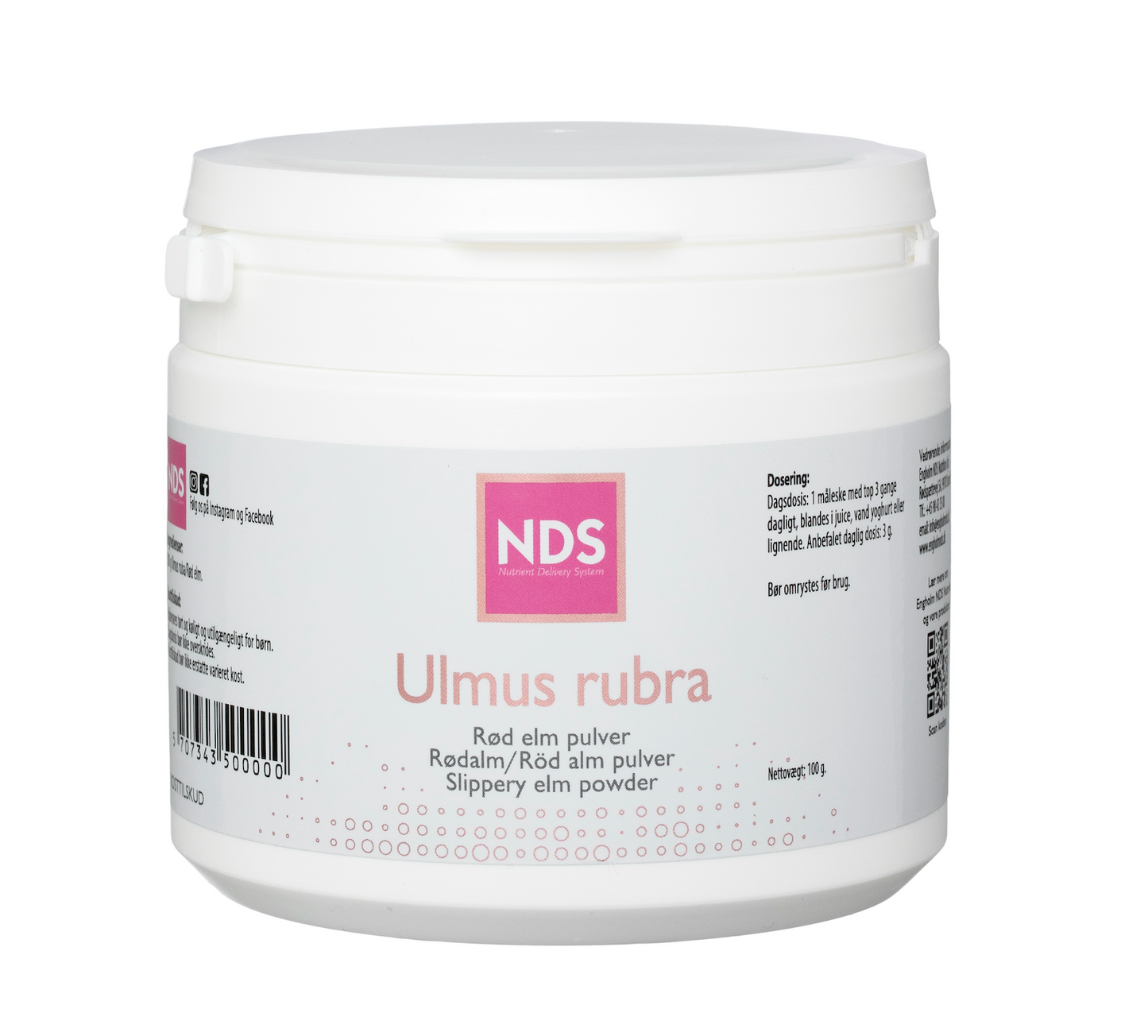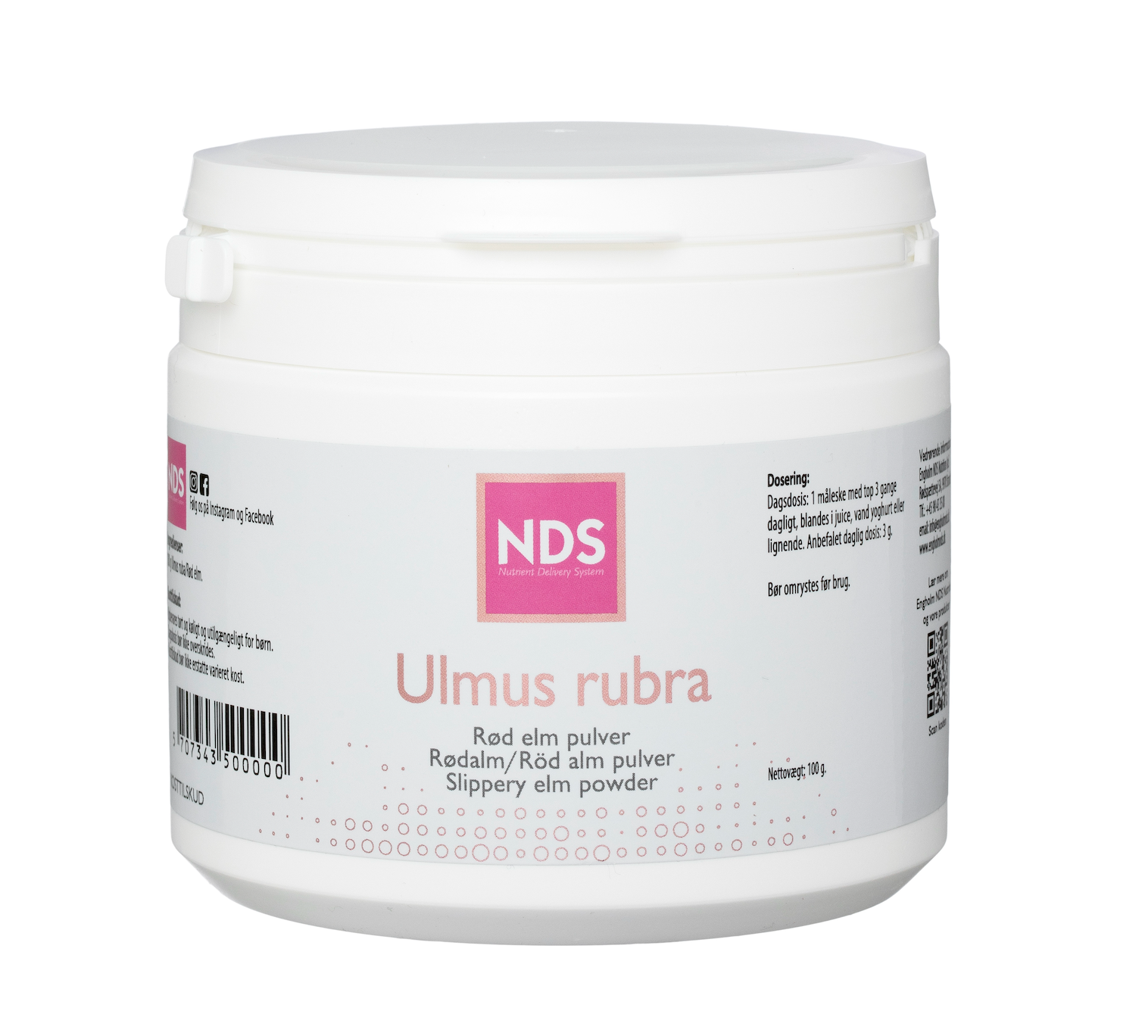NDS® Ulmus Rubra / Slippery Elm
NDS® Ulmus Rubra / Slippery Elm
NDS Nutrition
Out of stock
Couldn't load pickup availability
NDS® Ulmus Rubra. 100g Red Elm/Slippery Elm powder. Mix with water, juice, yoghurt or similar. Recommended daily dose: 3 gr. - 1 measuring spoon 3 times a day. The daily dose should not be exceeded.
Possibilities of use in the clinic: All irritated mucous membranes in the gastrointestinal tract, including the stomach catarrh, gastrointestinal ulcer, diarrhoea, ulcerative colitis, morbus chrons and other inflammatory conditions. After periods of illness, especially with inflammation and inflammation, and after the use of long-term medication where one is recommended convalescence period of at least 3 months.
Take a teaspoon after each meal, as needed or half an hour before bedtime.
Feel free to use Ulmus Rubra (elm bark) together with probiotics, as there are prebiotic substances in Ulmus rubra. Ulmus rubra can easily, and with advantage, be used with NDS herb dry extracts.
Ulmus rubra, also called red elm bark, is good for irritated mucous membranes.
Red elm is a large deciduous tree that can grow up to 30 meters. The bark of the tree is used as an effective remedy against irritated mucous membranes in humans and animals.
In the elm bark there is a group of mucilage substances, which consists of various long-chain sugar compounds – too called polysaccharides.
Mucous substances The group of mucus substances includes e.g. starch, pectin and gum substances. The mucus substances are characterized by the fact that they only work locally. They can absorb large amounts of liquid, making them come into being a jelly-like mass. Mucilage is chemically closely related with the human's own mucus. It can protect the intestinal mucosa, dampen a violent intestinal motility and normalize the bowels emptying function.
The mucilaginous substances relieve and protect mucous membranes against an acid environment, irritation and inflammation. Moreover, it inhibits inflammation of the respiratory tract and urinary tract via reflex effects. The mucilaginous substances can lower blood sugar as it attracts fast sugars and inhibits their release. It gives a more even release and thus a more stable blood sugar. Unstable blood sugar can, among other things, cause elevated cholesterol and triglycerides. The mucus substances can further absorb toxins, inhibit inflammation, inflammation and support the immune system, because the polysaccharides have a great importance for our immune system. Mucous substances are found in, for example Ulmus rubra (Elm bark).
Elmbark's demulcent/soothing, emollient and nourishing effect has a building effect on the mucous membranes. The bark has a soothing and regenerative effect on irritated mucous membranes. This is mainly due to the plant slime, which turns into a smooth and oily substance when it comes in contact with water. When the plant part comes into direct contact with inflamed surfaces, it relieves the irritation and puts a layer over the irritated mucous membrane. It also protects against damage to the mucous membrane.
The plant slime also attracts a number of toxins, which is attractive in connection with digestive problems with irritation and fungal problems.
There are no known side effects. However, it is not recommended to take Ulmus rubra (Elm bark) in conjunction with medicine. That may prevent absorption of medication and/or bind something of the medicine to himself. To be safe, separate medication intake and Ulmus rubra at 3 hour intervals. NDS
Daily Dose:
Daily Dose:
1 teaspoon (3g) mixed in water, stir well, leave for 1-15mins, then stir again and drink.
Avoid taking at least 30 mins before or after eating.
Do not use acidic drinks or hot drinks to mix.


